Collapse of Dignity (27 page)
Read Collapse of Dignity Online
Authors: Napoleon Gomez

But Lozano's most prominent scandal would occur in 2007. Zhenli Ye Gon was a Chinese entrepreneur and importer of pseudoephedrine who was accused by the Mexican government of drug dealing. In an interview with the Associated Press, Zhenli said that Lozano had asked him to store $205 million in cash at his home in Mexicoâmoney that Zhenli claimed was to be used for Felipe Calderón's 2005 presidential campaign. According to Zhenli, Lozano had threatened to kill him if he didn't hide the money. “
Copelas o cuello
,” Lozano had warned the Chinese drug dealerâ“Cooperate or we cut your neck”âpassing his hand over his throat as if his fingers were a knife. Lozano denied the accusations, and no legal action was taken against him. Calderón seemed to very quickly forget the incident ever happened, even though the Mexican people had seen the piles of money from the Zhenli's home on television news. After a while, the cash disappeared, never to be seen again.
In the first months of the Calderón administration, we witnessed Javier Lozano pick up the baton from Vicente Fox's labor department. As Calderón's labor secretary, he began to take a main role in the zealous defense of the interests of Grupo México. In doing so, he played a public role that in no way relates to his office. Lozano's undersecretary, Ãlvaro Castro Estrada, was no better: he seemed to be more of a Grupo México spokesperson than a public servant. Both made offers to stop the criminal charges against me and surrender the bank accounts if the miners ended all strikes against Grupo México and allowed the company to set up puppet unions.
Lozano Alarcón has been a resentful and obsessive persecutor of miners and of every other democratic and independent trade union in
Mexico. He has clashed most dramatically with the leadership of Los Mineros, but he has also antagonized the leaders of aviation union representatives, the widows of Pasta de Conchos, the National Workers' Union (UNT), and the workers of the Mexican Electricians' Union (SME), as well as prestigious legal defenders of labor, such as Nestor de Buen, Arturo Alcalde Justiniani, and Manuel Fuentes. These attorneys concluded that Lozano's decisions are clearly made for the benefit of the businessmen with whom he is complicit. Other labor lawyers who prefer anonymity, and some employees of the labor department themselves, have said the same thing.
As further proof, Germán Larrea frequently referred to Lozanoâin front of business associates and to the labor secretary's faceâas his “cat.” Larrea's insulting nickname for the labor secretary was confirmed to me by several businessmen who made trips to Canada, as well as by a journalist close to Larrea's defense team. It's just like Larrea to openly brag in front of everyone that a high-ranking public servant is nothing but his toy. In 2005, Larrea had also told me that Vicente Fox was a
pendejo
âa fool, an assholeâand that he could easily convince the president to go along with his plans. No doubt he felt the same way about Calderón, as well as his new cat, Lozano. Unbelievably, Lozano was happy to play the role of servant to Larrea. Every day he spent in office, he displayed his loyalty to his new master.
A scene that took place at a major labor rally in 2007 is representative of his condescending, careless attitude. A group of workers from various unions, including the miners, held a protest outside the offices of the department of labor, demanding to meet with Lozano to discuss his support of the false allegations still being pressed by ElÃas Morales and Grupo México. The workers wanted to talk with him directly about the issue and force him to explain his support for this unlawful defamation. Yet all Lozano did was order that a large sign be placed on the railing of the building, bearing one provocative sentence: “Criminal cases are not handled in this Department.” His complicit servitude to Germán Feliciano Larrea had been proven again.
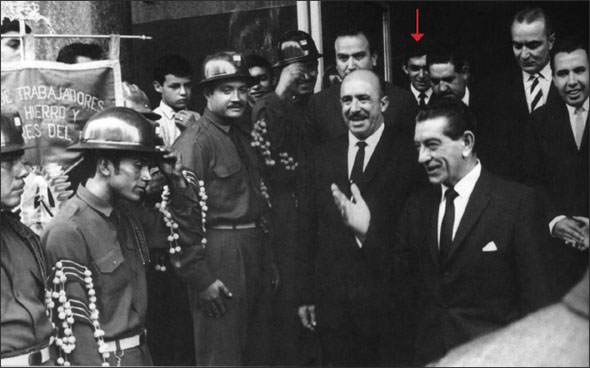
Napoleón Gómez Sada at his first election as General Secretary of the National Union of Mine, Metal, and Steel Workers of the Mexican Republic with Mexican president Adolfo López Mateos during the 1960 National Convention. Napoleón Gómez Urrutia is behind, fourth person from right.
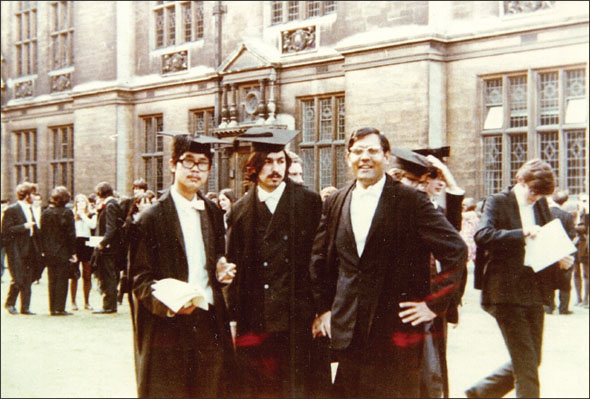
Oxford University: Napoleón Gómez with classmates at graduation.
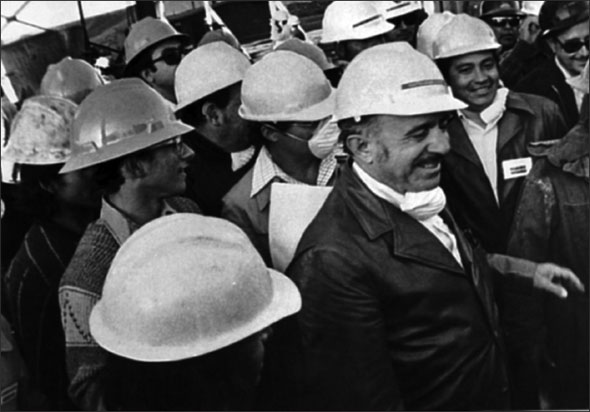
Napoleón Gómez Sada during a mining tour in the north of Mexico.
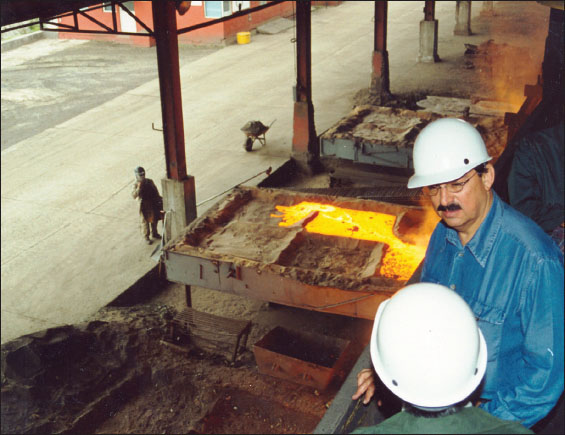
Napoleón Gómez was General Director of CompañÃa Minera Autlán in 1992â1993. Here he speaks with a worker at the smelter facility in the town of Teziutlán, Puebla.
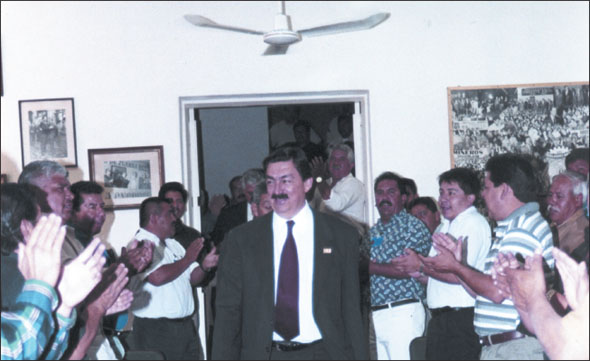
Napoleoìn Goìmez was elected for the first time in 2001 General Secretary of the National Union of Mine, Metal, and Steel Workers of the Mexican Republic.
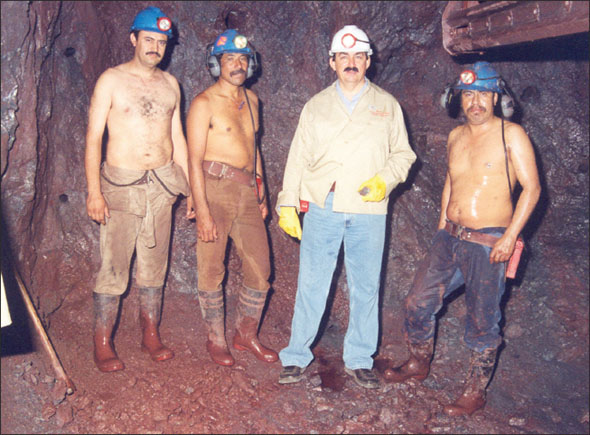
Napoleoìn Gómez with mineworkers in Hércules, an iron ore mine in the state of Coahuila.
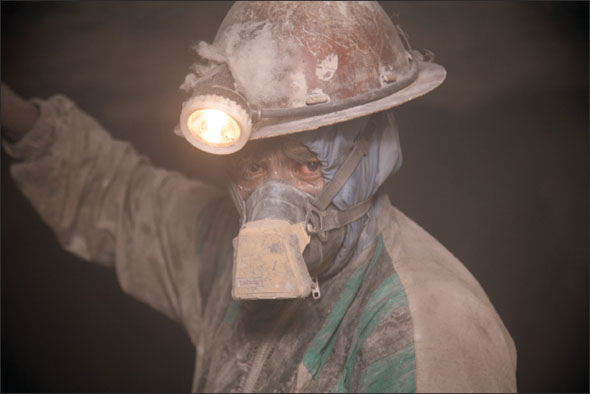
In this image, photographer Peter Langer shows the intensity of the harsh working conditions found inside the mine.
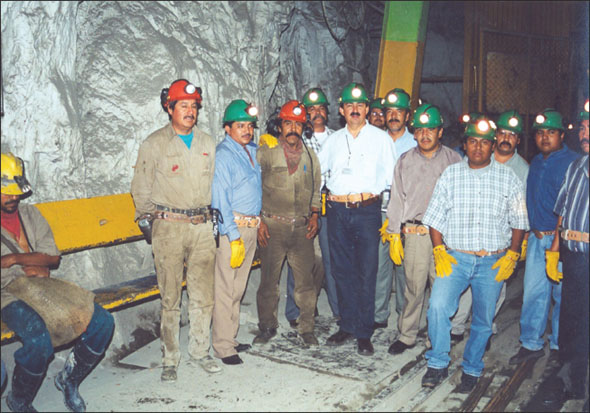
Napoleoìn Gómez with mineworkers in the Mine of Fresnillo, in the state of Zacatecasâthe largest silver mine in the world.

Napoleón Gómez inspecting safety and working conditions at Las Cuevas Mine in San Luis Potosi operated by Mexichem, one of the biggest fluorite producers in the world.
